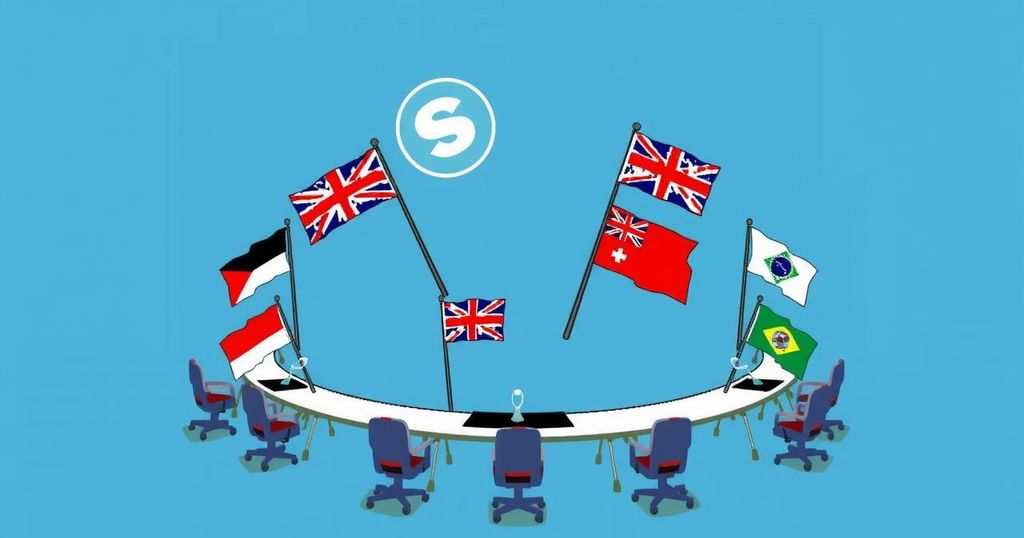Climate change
Global news
” GOMEZ, ALLIANCE OF, ALLIANCE OF SMALL ISLAND STATES, AP, ASSOCIATED PRESS, CLIMATE CHANGE, COLOMBIA, CUBA, EUROPEAN UNION, EVANS NJEWA, GEOPOLITICS, GOMEZ, INTERNATIONAL RELATIONS, JOHN PODESTA, JUAN CARLOS MONTERREY GOMEZ, LDC, LEAST DEVELOPED COUNTRIES, NORTH AMERICA, PANAMA, PARIS AGREEMENT, SOUTH AMERICA, STATES, SUSAN, SUSANA MOHAMED, THE ASSOCIATED PRESS, U. S, UN, UNITED NATIONS
Fatima Khan
0 Comments
UN Climate Talks Stall as Developing Nations Reject Funding Proposals
At the UN climate talks, developing nations rejected a funding proposal aimed at climate change alleviation, describing it as inadequate. African and small island state negotiators staged a walkout due to dissatisfaction, claiming the terms fell short of a necessary $1.3 trillion. Wealthier nations are accused of delaying progress, with developing countries urging for a more substantial financial commitment.
During an intense Saturday session of negotiations at the United Nations climate talks, representatives from both developed and developing nations faced significant challenges as they attempted to finalize a funding agreement aimed at aiding developing countries in their efforts to combat climate change. The rough draft initiated for discussion received substantial pushback, particularly from African delegates and representatives of small island states, who found the terms unacceptable, prompting some to walk out in protest.
Evans Njewa, the chair of the Least Developed Countries (LDC) group, emphasized the necessity of discussing the funding with other developing countries before moving forward, stating, “The current deal is unacceptable for us. We need to speak to other developing countries and decide what to do.” This sentiment was echoed by Colombia’s Environment Minister Susana Mohamed, who characterized the situation as one of dissatisfaction rather than outright protest.
As the discussions continued, accusations flew regarding perceived attempts by wealthier nations to minimize their financial obligations to developing countries, further exacerbated by the frustrations of smaller nations feeling overlooked throughout the two-week conference. Panama’s chief negotiator, Juan Carlos Monterrey Gomez, expressed growing despair over the situation, stating, “Every minute that passes we are going to just keep getting weaker and weaker and weaker… they push it until our negotiators leave.”
Reports indicated that while the latest proposal aimed to secure $300 billion in annual climate finance by 2035, developing countries are advocating for a more substantial sum of $1.3 trillion to effectively tackle climate-induced challenges. Notably, they accused developed nations of stalling negotiations. Eamon Ryan, Ireland’s Environment Minister, stressed the need for mechanisms to reach the desired funding levels, including carbon market solutions which may not be viable for impoverished nations that carry substantial debt burdens.
The outlook for a successful funding agreement remains uncertain, with key leaders such as Alden Meyer of climate think tank E3G articulating concerns that negotiations might not yield a satisfactory outcome. Despite the discord, some delegates, including Pakistan’s Nabeel Munir, expressed cautious optimism about the discussions continuing constructively, underlining that inclusivity in dialogue would be critical for progressing towards an equitable financing agreement.
The Alliance of Small Island States remarked on their desire to engage in the negotiations, provided that the process remains inclusive, indicating that their continued participation would be contingent upon these conditions being met.
The ongoing United Nations climate negotiations aim to reach a financial agreement that will assist developing nations in addressing the myriad challenges posed by climate change. The complexities of these discussions stem from the disparities between the needs of vulnerable nations and the offers from wealthier countries, whose commitments often fall short of what is required. Developing countries, especially those most affected by climate-related disasters, are pressing for increased financial support as established under previous agreements, particularly the Paris Agreement.
In summary, the UN climate talks currently face severe setbacks as developing nations reject the proposed funding agreements, citing inadequate support for their urgent needs. With tensions mounting and critical negotiations at risk of collapse, it remains imperative for wealthier nations to engage earnestly with their developing counterparts to forge a sustainable and inclusive path forward. The calls for justice and equitable funding underscore the stakes of the negotiations, with the world’s most vulnerable populations hanging in the balance.
Original Source: www.voanews.com




Post Comment